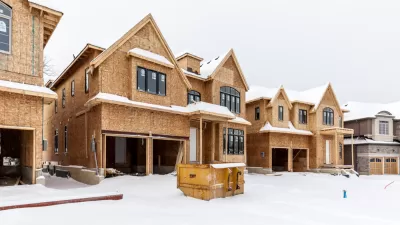While the decline may not be visible, total auto ownership peaked in 2008 according to a new report by Michael Sivak of the University of Michigan's Transportation Research Institute. He set out to determine the cause - was it the economic recession?
As an associate editor at The Atlantic, Jordan Weissmann has been following the reduction of driving in the U.S and written about the reduction in younger drivers. He wanted to know if "the U.S. is getting over car culture", or if the driving reduction was mainly a product of the economic downturn. He looked toward Sivak's findings (PDF) for an insight.
Sivak analyzed the period from 1984 through 2011. He examined the registration "of light-duty vehicles (cars, pickup trucks, SUVs, and vans) for each year from 1984 through 2011."
Its key take-away is that the number of cars per household actually began to decline pre-recession, after 2006. Same goes for cars per licensed driver and cars per person.
In fact, the accompanying graph shows it all, with the vehicle registration rate - per person, per licensed driver, and per household, peaking around 2006 - before the recession which is recognized as beginning in December, 2007 per U.S. Bureau of Labor Statistics (PDF).
Yet, Weissmann is not entirely sold, pointing to pre-recession economic factors, e.g. home values peaked in 2006 and suspects that influenced car ownership rates.
He concludes that "(t)he decline of car ownership might well turn out to be a long-term trend with cultural and demographic roots. But if so, the housing bust and recession still seem to have been the tipping point."
He may be partially correct - if you distinguish between absolute numbers and rate of ownership.
From Sivak's abstract (PDF): "...with the improving economy and the expected increase in the U.S. population, it is highly likely that (from a long-term perspective) the absolute number of vehicles has not yet peaked." However, if you believe Sivak, the rate of ownership peaked seven years ago.
FULL STORY: Has the U.S. Passed Peak Car?

Maui's Vacation Rental Debate Turns Ugly
Verbal attacks, misinformation campaigns and fistfights plague a high-stakes debate to convert thousands of vacation rentals into long-term housing.

Planetizen Federal Action Tracker
A weekly monitor of how Trump’s orders and actions are impacting planners and planning in America.

San Francisco Suspends Traffic Calming Amidst Record Deaths
Citing “a challenging fiscal landscape,” the city will cease the program on the heels of 42 traffic deaths, including 24 pedestrians.

Defunct Pittsburgh Power Plant to Become Residential Tower
A decommissioned steam heat plant will be redeveloped into almost 100 affordable housing units.

Trump Prompts Restructuring of Transportation Research Board in “Unprecedented Overreach”
The TRB has eliminated more than half of its committees including those focused on climate, equity, and cities.

Amtrak Rolls Out New Orleans to Alabama “Mardi Gras” Train
The new service will operate morning and evening departures between Mobile and New Orleans.
Urban Design for Planners 1: Software Tools
This six-course series explores essential urban design concepts using open source software and equips planners with the tools they need to participate fully in the urban design process.
Planning for Universal Design
Learn the tools for implementing Universal Design in planning regulations.
Heyer Gruel & Associates PA
JM Goldson LLC
Custer County Colorado
City of Camden Redevelopment Agency
City of Astoria
Transportation Research & Education Center (TREC) at Portland State University
Jefferson Parish Government
Camden Redevelopment Agency
City of Claremont





























